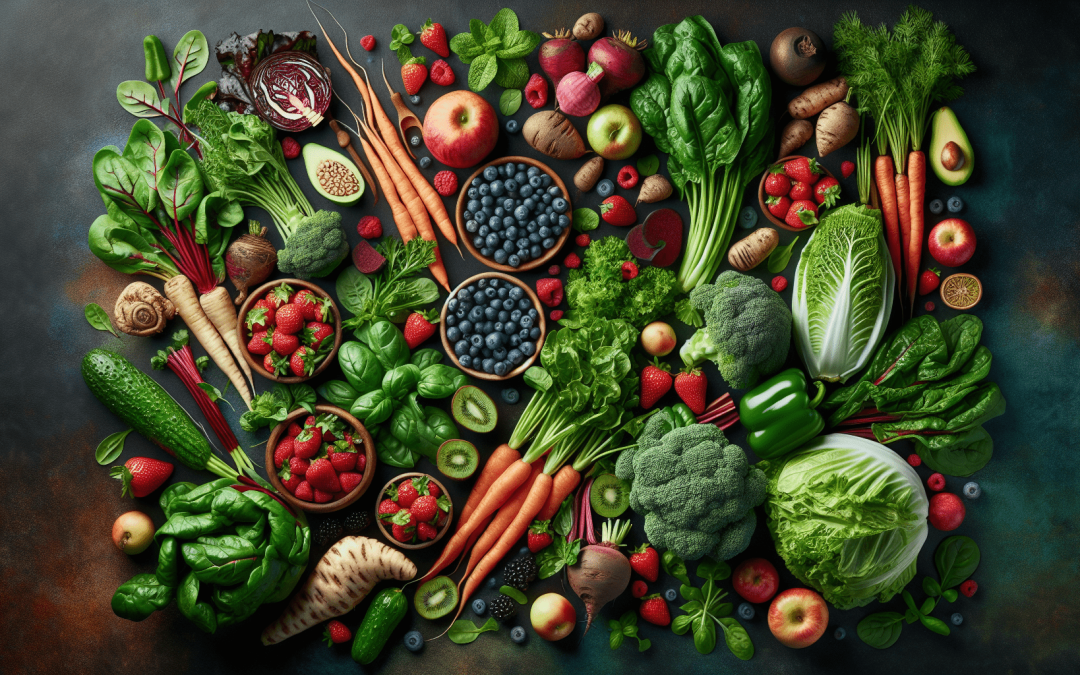Organic Nutrition: Key Facts You Need to Know
Understanding Organic Nutrition
Organic nutrition refers to the consumption of foods that are grown or produced without synthetic pesticides, hormones, antibiotics, and genetically modified organisms (GMOs). By choosing organic foods, you are not only supporting sustainable agriculture practices but also reducing your exposure to potentially harmful chemicals.
The Benefits of Organic Nutrition
Eating organic foods has numerous benefits for your health, the environment, and local communities. Organic farming practices promote soil health, water conservation, and biodiversity, which are essential for the long-term sustainability of our planet. Additionally, organic foods are often richer in nutrients and antioxidants compared to their conventionally grown counterparts.
Improved Nutritional Content
Organic fruits, vegetables, and grains are grown in nutrient-rich soil, which results in higher levels of vitamins, minerals, and phytochemicals. These are essential for maintaining optimal health and reducing the risk of chronic diseases such as heart disease, cancer, and diabetes.
Reduced Exposure to Harmful Chemicals
Conventional farming practices often rely on synthetic pesticides and fertilizers to control pests and boost crop yields. These chemicals can leave residues on food products and have been linked to various health problems, including hormone disruption, neurological conditions, and cancer. By choosing organic foods, you can minimize your exposure to these potentially harmful substances.
Environmental Sustainability
Organic farming methods focus on preserving and enhancing the health of the soil, water, and ecosystems. By avoiding synthetic chemicals and promoting biodiversity, organic agriculture helps protect wildlife, reduce air and water pollution, and combat climate change. Supporting organic farming is a step towards a more sustainable and resilient food system for future generations.
Making the Switch to Organic Nutrition
Transitioning to an organic diet may seem overwhelming at first, but it is a gradual process that can have significant benefits for your health and well-being. Here are some practical tips to help you make the switch to organic nutrition:
Start Small
Begin by incorporating a few organic products into your diet each week, such as fruits, vegetables, dairy, or grains. This gradual approach will allow you to adjust to the taste and texture of organic foods while exploring new options available in your local grocery store or farmers’ market.
Prioritize the “Dirty Dozen”
When choosing organic foods, prioritize items from the Environmental Working Group’s (EWG) “Dirty Dozen” list, which includes produce items with the highest pesticide residues. By selecting organic versions of these fruits and vegetables, you can reduce your exposure to harmful chemicals and support sustainable farming practices.
Buy Local and Seasonal
Supporting local farmers and producers is an excellent way to access fresh, organic foods while reducing your carbon footprint. Visit farmers’ markets, community-supported agriculture (CSA) programs, or organic food co-ops to purchase seasonal produce, meat, dairy, and pantry staples directly from the source.
Grow Your Own
If you have space and the resources, consider starting a small garden or growing your own herbs, fruits, or vegetables. Gardening can be a rewarding experience that allows you to connect with nature, reduce food waste, and enjoy the taste of freshly harvested organic produce.
Understanding Organic Labels
When shopping for organic foods, it is essential to understand the different labels and certifications that indicate a product’s organic status. Here are some common organic labels and what they mean:
USDA Organic
The USDA Organic label certifies that a food product has been grown or produced according to strict federal guidelines set by the United States Department of Agriculture (USDA). This certification ensures that the food is free of synthetic pesticides, fertilizers, hormones, and GMOs.
Non-GMO Project Verified
The Non-GMO Project Verified label indicates that a food product has been tested and verified to be free of genetically modified organisms (GMOs). This certification provides consumers with transparency and assurance that the product meets non-GMO standards.
Certified Organic by [Certifying Body]
Certified Organic labels from private certifying bodies indicate that a food product has met specific organic standards established by the certifying organization. These labels may vary depending on the region or country of origin, so it is essential to research the certifying body’s guidelines.
Organic 100% vs. Made with Organic Ingredients
Products labeled as “Organic 100%” contain only organic ingredients and have been produced without synthetic chemicals. On the other hand, products labeled as “Made with Organic Ingredients” contain at least 70% organic ingredients but may also include non-organic substances.
Common Misconceptions About Organic Nutrition
Despite the growing popularity of organic foods, there are still some misconceptions and myths surrounding organic nutrition. It is essential to separate fact from fiction to make informed decisions about your dietary choices. Here are some common misconceptions about organic nutrition:
Organic Foods Are too Expensive
While organic foods may be more expensive than conventional options, the long-term benefits of supporting organic agriculture and investing in your health are invaluable. Look for local and seasonal organic produce, compare prices at different retailers, and consider growing your own food to reduce costs.
Organic Foods Are Not More Nutritious
Contrary to popular belief, organic foods are often richer in essential nutrients, antioxidants, and phytochemicals compared to conventionally grown foods. Studies have shown that organic fruits, vegetables, and grains have higher levels of vitamins, minerals, and beneficial compounds that support overall health and well-being.
Organic Foods Don’t Taste as Good
The taste and quality of organic foods can vary depending on factors such as soil health, growing conditions, and freshness. Many people find that organic produce has a more vibrant flavor, texture, and aroma compared to its conventionally grown counterparts. Experiment with different organic products to discover new flavors and culinary possibilities.
Tips for Incorporating Organic Nutrition into Your Lifestyle
If you are interested in adopting an organic diet but are unsure where to start, here are some practical tips for incorporating organic nutrition into your lifestyle:
Plan Your Meals
Create a weekly meal plan that includes a variety of organic foods such as fruits, vegetables, whole grains, legumes, lean proteins, and dairy products. Planning ahead can help you make informed choices at the grocery store, reduce food waste, and save time during meal preparation.
Cook at Home
Preparing homemade meals using fresh, organic ingredients is a great way to control the quality and nutritional content of your diet. Experiment with new recipes, culinary techniques, and seasonal ingredients to create delicious and wholesome meals for yourself and your family.
Support Local Farmers
Get to know local farmers, producers, and community-supported agriculture (CSA) programs in your area to access fresh, seasonal, and organic foods. By supporting local food systems, you can build relationships with growers, learn about sustainable farming practices, and enjoy the benefits of nutritious, locally grown produce.
Be Mindful of Food Labels
Read food labels carefully to identify organic products, avoid hidden additives, and make informed choices about the foods you consume. Look for organic labels, non-GMO certifications, and transparent ingredient lists that reflect your values and preferences as a conscious consumer.
Listen to Your Body
Pay attention to how your body feels after eating organic foods and make adjustments based on your individual preferences and dietary needs. Keep a food journal, consult with a nutritionist or healthcare provider, and listen to your body’s signals to optimize your health and well-being through organic nutrition.
By incorporating organic foods into your diet and lifestyle, you can nourish your body with wholesome ingredients, support sustainable agriculture practices, and enjoy the many benefits of organic nutrition. Start small, prioritize organic options, and explore new flavors, textures, and culinary possibilities to discover the joys of organic eating. Your health, the environment, and future generations will thank you for choosing organic nutrition as a path towards a healthier and more sustainable future.









